Motivation's Impact on Employee Retention in UK Budget Hotels
VerifiedAdded on 2020/01/21
|66
|18960
|122
Report
AI Summary
This report investigates the impact of motivation on employee retention within the budget hotel sector in the UK. The study explores the significance of employee retention for business success, particularly in the competitive hospitality industry. It examines the challenges faced by budget hotels in retaining employees, including issues related to low wages, lack of benefits, and high turnover rates. The research employs both qualitative and quantitative methods, including literature reviews, surveys, and data analysis, to identify key motivational factors influencing employee retention. The findings highlight the importance of effective motivational strategies, career advancement opportunities, and addressing issues such as poor management and excessive workload. The report concludes with recommendations for budget hotels to improve employee retention rates, emphasizing the need for a comprehensive approach to motivation and employee satisfaction to enhance business performance and customer service. The study also emphasizes the need for further research in this area.
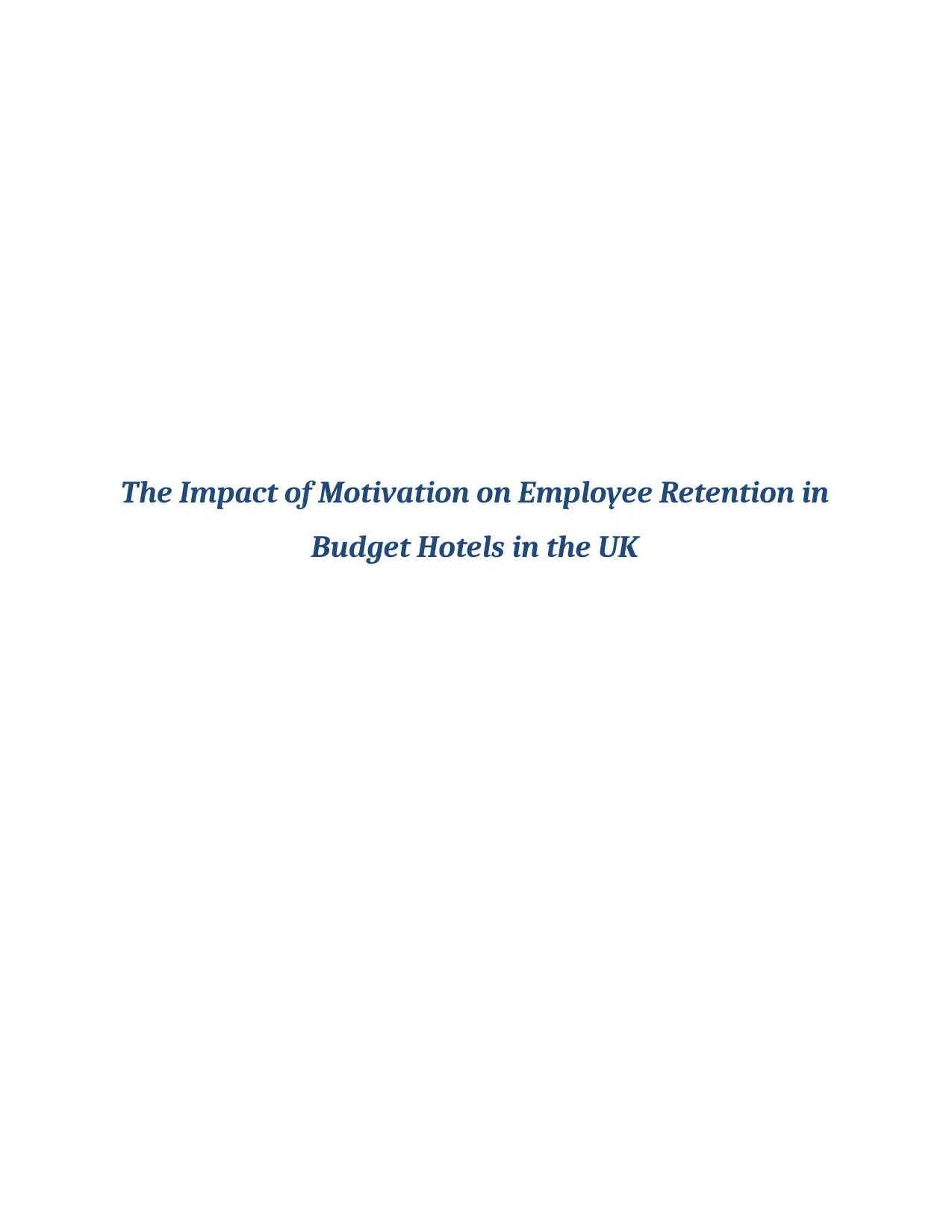
The Impact of Motivation on Employee Retention in
Budget Hotels in the UK
Budget Hotels in the UK
Paraphrase This Document
Need a fresh take? Get an instant paraphrase of this document with our AI Paraphraser
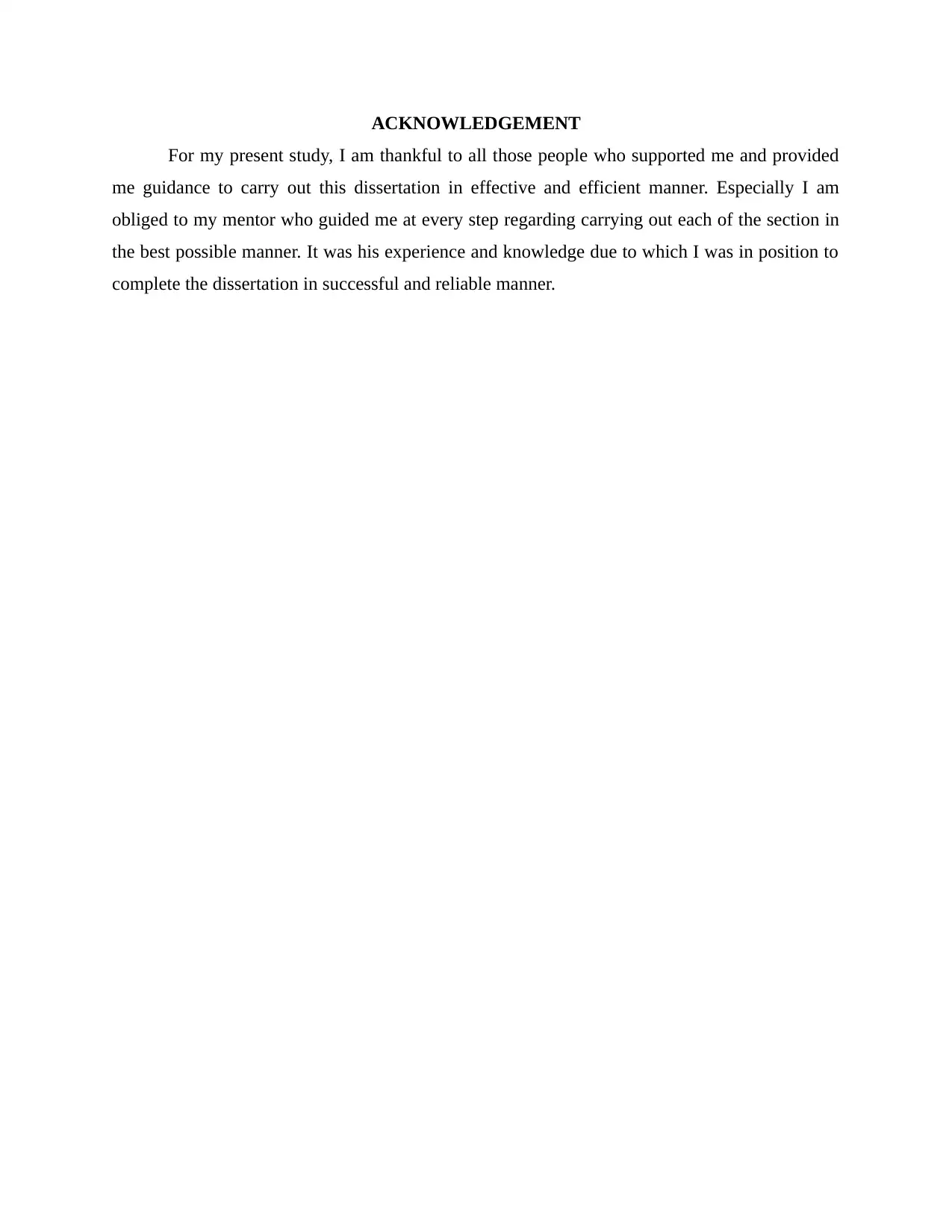
ACKNOWLEDGEMENT
For my present study, I am thankful to all those people who supported me and provided
me guidance to carry out this dissertation in effective and efficient manner. Especially I am
obliged to my mentor who guided me at every step regarding carrying out each of the section in
the best possible manner. It was his experience and knowledge due to which I was in position to
complete the dissertation in successful and reliable manner.
For my present study, I am thankful to all those people who supported me and provided
me guidance to carry out this dissertation in effective and efficient manner. Especially I am
obliged to my mentor who guided me at every step regarding carrying out each of the section in
the best possible manner. It was his experience and knowledge due to which I was in position to
complete the dissertation in successful and reliable manner.
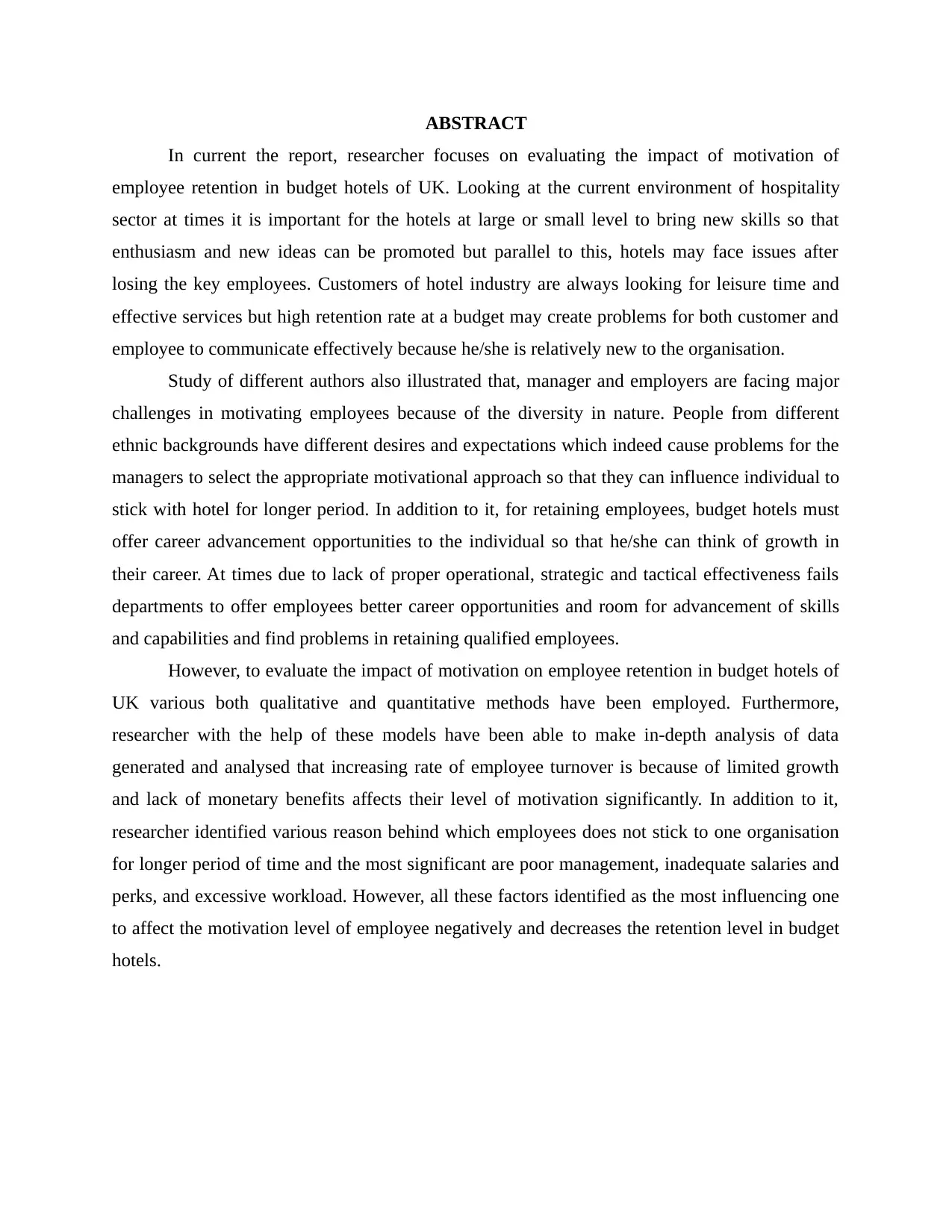
ABSTRACT
In current the report, researcher focuses on evaluating the impact of motivation of
employee retention in budget hotels of UK. Looking at the current environment of hospitality
sector at times it is important for the hotels at large or small level to bring new skills so that
enthusiasm and new ideas can be promoted but parallel to this, hotels may face issues after
losing the key employees. Customers of hotel industry are always looking for leisure time and
effective services but high retention rate at a budget may create problems for both customer and
employee to communicate effectively because he/she is relatively new to the organisation.
Study of different authors also illustrated that, manager and employers are facing major
challenges in motivating employees because of the diversity in nature. People from different
ethnic backgrounds have different desires and expectations which indeed cause problems for the
managers to select the appropriate motivational approach so that they can influence individual to
stick with hotel for longer period. In addition to it, for retaining employees, budget hotels must
offer career advancement opportunities to the individual so that he/she can think of growth in
their career. At times due to lack of proper operational, strategic and tactical effectiveness fails
departments to offer employees better career opportunities and room for advancement of skills
and capabilities and find problems in retaining qualified employees.
However, to evaluate the impact of motivation on employee retention in budget hotels of
UK various both qualitative and quantitative methods have been employed. Furthermore,
researcher with the help of these models have been able to make in-depth analysis of data
generated and analysed that increasing rate of employee turnover is because of limited growth
and lack of monetary benefits affects their level of motivation significantly. In addition to it,
researcher identified various reason behind which employees does not stick to one organisation
for longer period of time and the most significant are poor management, inadequate salaries and
perks, and excessive workload. However, all these factors identified as the most influencing one
to affect the motivation level of employee negatively and decreases the retention level in budget
hotels.
In current the report, researcher focuses on evaluating the impact of motivation of
employee retention in budget hotels of UK. Looking at the current environment of hospitality
sector at times it is important for the hotels at large or small level to bring new skills so that
enthusiasm and new ideas can be promoted but parallel to this, hotels may face issues after
losing the key employees. Customers of hotel industry are always looking for leisure time and
effective services but high retention rate at a budget may create problems for both customer and
employee to communicate effectively because he/she is relatively new to the organisation.
Study of different authors also illustrated that, manager and employers are facing major
challenges in motivating employees because of the diversity in nature. People from different
ethnic backgrounds have different desires and expectations which indeed cause problems for the
managers to select the appropriate motivational approach so that they can influence individual to
stick with hotel for longer period. In addition to it, for retaining employees, budget hotels must
offer career advancement opportunities to the individual so that he/she can think of growth in
their career. At times due to lack of proper operational, strategic and tactical effectiveness fails
departments to offer employees better career opportunities and room for advancement of skills
and capabilities and find problems in retaining qualified employees.
However, to evaluate the impact of motivation on employee retention in budget hotels of
UK various both qualitative and quantitative methods have been employed. Furthermore,
researcher with the help of these models have been able to make in-depth analysis of data
generated and analysed that increasing rate of employee turnover is because of limited growth
and lack of monetary benefits affects their level of motivation significantly. In addition to it,
researcher identified various reason behind which employees does not stick to one organisation
for longer period of time and the most significant are poor management, inadequate salaries and
perks, and excessive workload. However, all these factors identified as the most influencing one
to affect the motivation level of employee negatively and decreases the retention level in budget
hotels.
⊘ This is a preview!⊘
Do you want full access?
Subscribe today to unlock all pages.

Trusted by 1+ million students worldwide
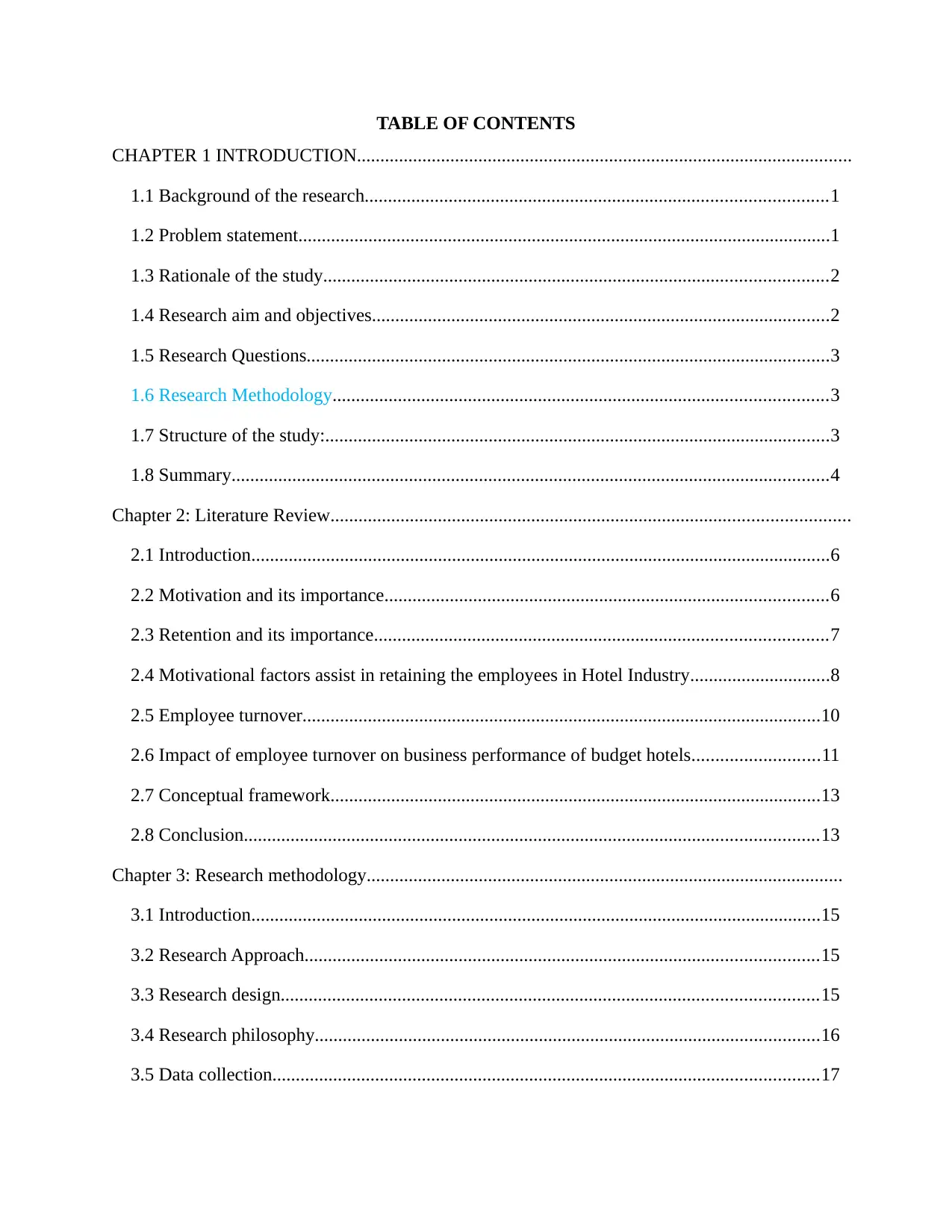
TABLE OF CONTENTS
CHAPTER 1 INTRODUCTION..........................................................................................................
1.1 Background of the research...................................................................................................1
1.2 Problem statement..................................................................................................................1
1.3 Rationale of the study............................................................................................................2
1.4 Research aim and objectives..................................................................................................2
1.5 Research Questions................................................................................................................3
1.6 Research Methodology..........................................................................................................3
1.7 Structure of the study:............................................................................................................3
1.8 Summary................................................................................................................................4
Chapter 2: Literature Review...............................................................................................................
2.1 Introduction............................................................................................................................6
2.2 Motivation and its importance...............................................................................................6
2.3 Retention and its importance.................................................................................................7
2.4 Motivational factors assist in retaining the employees in Hotel Industry..............................8
2.5 Employee turnover...............................................................................................................10
2.6 Impact of employee turnover on business performance of budget hotels...........................11
2.7 Conceptual framework.........................................................................................................13
2.8 Conclusion...........................................................................................................................13
Chapter 3: Research methodology......................................................................................................
3.1 Introduction..........................................................................................................................15
3.2 Research Approach..............................................................................................................15
3.3 Research design...................................................................................................................15
3.4 Research philosophy............................................................................................................16
3.5 Data collection.....................................................................................................................17
CHAPTER 1 INTRODUCTION..........................................................................................................
1.1 Background of the research...................................................................................................1
1.2 Problem statement..................................................................................................................1
1.3 Rationale of the study............................................................................................................2
1.4 Research aim and objectives..................................................................................................2
1.5 Research Questions................................................................................................................3
1.6 Research Methodology..........................................................................................................3
1.7 Structure of the study:............................................................................................................3
1.8 Summary................................................................................................................................4
Chapter 2: Literature Review...............................................................................................................
2.1 Introduction............................................................................................................................6
2.2 Motivation and its importance...............................................................................................6
2.3 Retention and its importance.................................................................................................7
2.4 Motivational factors assist in retaining the employees in Hotel Industry..............................8
2.5 Employee turnover...............................................................................................................10
2.6 Impact of employee turnover on business performance of budget hotels...........................11
2.7 Conceptual framework.........................................................................................................13
2.8 Conclusion...........................................................................................................................13
Chapter 3: Research methodology......................................................................................................
3.1 Introduction..........................................................................................................................15
3.2 Research Approach..............................................................................................................15
3.3 Research design...................................................................................................................15
3.4 Research philosophy............................................................................................................16
3.5 Data collection.....................................................................................................................17
Paraphrase This Document
Need a fresh take? Get an instant paraphrase of this document with our AI Paraphraser

3.6 Sampling..............................................................................................................................17
3.7 Data analysis........................................................................................................................18
3.8 Reliability and validity.........................................................................................................18
3.9 Ethical consideration............................................................................................................18
3.10 Limitations.........................................................................................................................19
3.11 Research Onion Model......................................................................................................19
Chapter 4: Data analysis.....................................................................................................................
3.1 Introduction..........................................................................................................................21
3.2 Qualitative Analysis.............................................................................................................21
3.3 Quantitative Analysis...........................................................................................................38
3.4 Correlation Regression:.......................................................................................................38
3.5 Chi-Square test:....................................................................................................................43
3.6 Independent T-Test...............................................................................................................44
3.7 Conclusion...........................................................................................................................47
Chapter 5: Conclusion and Recommendations...................................................................................
5.1 Conclusion...........................................................................................................................48
5.2 Recommendations................................................................................................................49
References..........................................................................................................................................
Appendix............................................................................................................................................
Questionnaire.............................................................................................................................57
3.7 Data analysis........................................................................................................................18
3.8 Reliability and validity.........................................................................................................18
3.9 Ethical consideration............................................................................................................18
3.10 Limitations.........................................................................................................................19
3.11 Research Onion Model......................................................................................................19
Chapter 4: Data analysis.....................................................................................................................
3.1 Introduction..........................................................................................................................21
3.2 Qualitative Analysis.............................................................................................................21
3.3 Quantitative Analysis...........................................................................................................38
3.4 Correlation Regression:.......................................................................................................38
3.5 Chi-Square test:....................................................................................................................43
3.6 Independent T-Test...............................................................................................................44
3.7 Conclusion...........................................................................................................................47
Chapter 5: Conclusion and Recommendations...................................................................................
5.1 Conclusion...........................................................................................................................48
5.2 Recommendations................................................................................................................49
References..........................................................................................................................................
Appendix............................................................................................................................................
Questionnaire.............................................................................................................................57
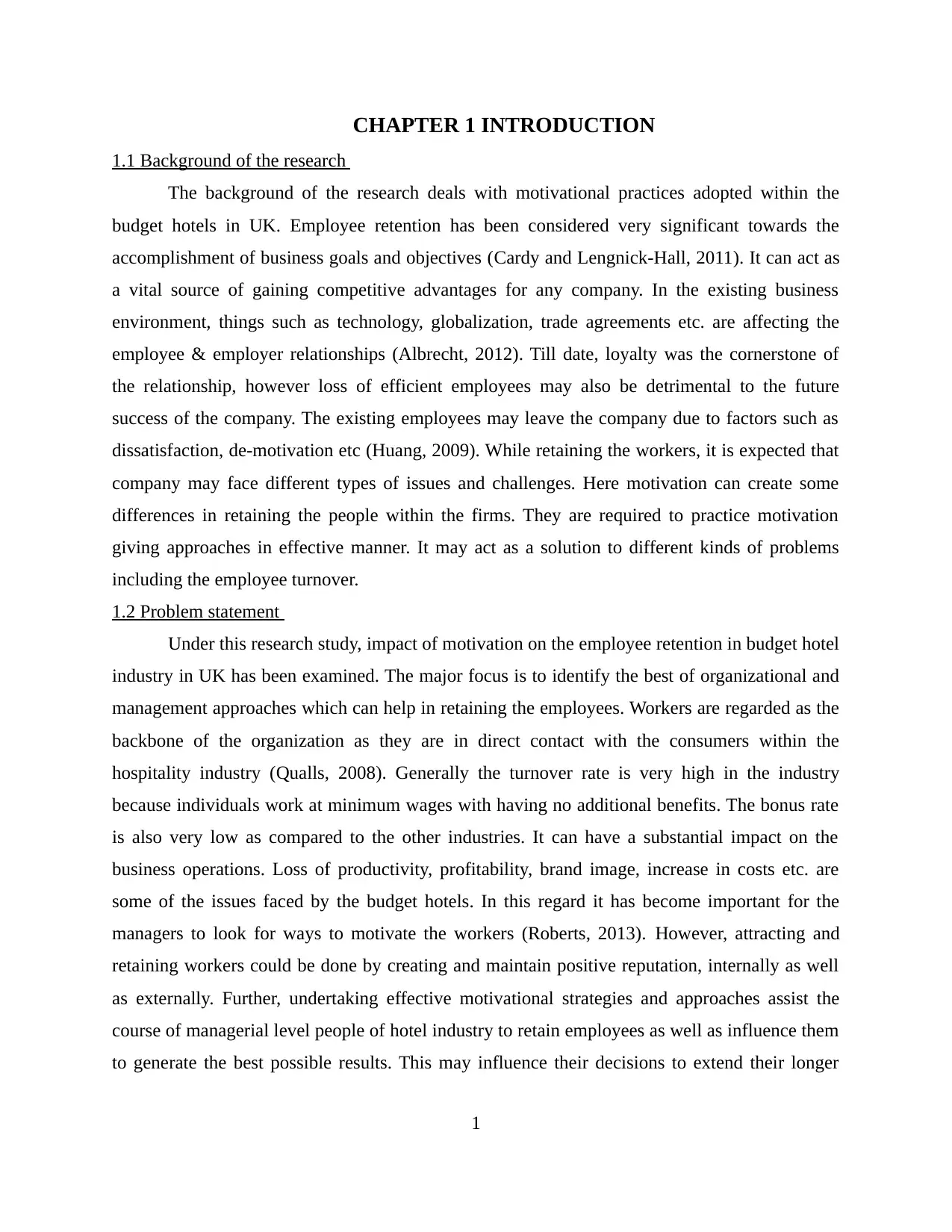
CHAPTER 1 INTRODUCTION
1.1 Background of the research
The background of the research deals with motivational practices adopted within the
budget hotels in UK. Employee retention has been considered very significant towards the
accomplishment of business goals and objectives (Cardy and Lengnick-Hall, 2011). It can act as
a vital source of gaining competitive advantages for any company. In the existing business
environment, things such as technology, globalization, trade agreements etc. are affecting the
employee & employer relationships (Albrecht, 2012). Till date, loyalty was the cornerstone of
the relationship, however loss of efficient employees may also be detrimental to the future
success of the company. The existing employees may leave the company due to factors such as
dissatisfaction, de-motivation etc (Huang, 2009). While retaining the workers, it is expected that
company may face different types of issues and challenges. Here motivation can create some
differences in retaining the people within the firms. They are required to practice motivation
giving approaches in effective manner. It may act as a solution to different kinds of problems
including the employee turnover.
1.2 Problem statement
Under this research study, impact of motivation on the employee retention in budget hotel
industry in UK has been examined. The major focus is to identify the best of organizational and
management approaches which can help in retaining the employees. Workers are regarded as the
backbone of the organization as they are in direct contact with the consumers within the
hospitality industry (Qualls, 2008). Generally the turnover rate is very high in the industry
because individuals work at minimum wages with having no additional benefits. The bonus rate
is also very low as compared to the other industries. It can have a substantial impact on the
business operations. Loss of productivity, profitability, brand image, increase in costs etc. are
some of the issues faced by the budget hotels. In this regard it has become important for the
managers to look for ways to motivate the workers (Roberts, 2013). However, attracting and
retaining workers could be done by creating and maintain positive reputation, internally as well
as externally. Further, undertaking effective motivational strategies and approaches assist the
course of managerial level people of hotel industry to retain employees as well as influence them
to generate the best possible results. This may influence their decisions to extend their longer
1
1.1 Background of the research
The background of the research deals with motivational practices adopted within the
budget hotels in UK. Employee retention has been considered very significant towards the
accomplishment of business goals and objectives (Cardy and Lengnick-Hall, 2011). It can act as
a vital source of gaining competitive advantages for any company. In the existing business
environment, things such as technology, globalization, trade agreements etc. are affecting the
employee & employer relationships (Albrecht, 2012). Till date, loyalty was the cornerstone of
the relationship, however loss of efficient employees may also be detrimental to the future
success of the company. The existing employees may leave the company due to factors such as
dissatisfaction, de-motivation etc (Huang, 2009). While retaining the workers, it is expected that
company may face different types of issues and challenges. Here motivation can create some
differences in retaining the people within the firms. They are required to practice motivation
giving approaches in effective manner. It may act as a solution to different kinds of problems
including the employee turnover.
1.2 Problem statement
Under this research study, impact of motivation on the employee retention in budget hotel
industry in UK has been examined. The major focus is to identify the best of organizational and
management approaches which can help in retaining the employees. Workers are regarded as the
backbone of the organization as they are in direct contact with the consumers within the
hospitality industry (Qualls, 2008). Generally the turnover rate is very high in the industry
because individuals work at minimum wages with having no additional benefits. The bonus rate
is also very low as compared to the other industries. It can have a substantial impact on the
business operations. Loss of productivity, profitability, brand image, increase in costs etc. are
some of the issues faced by the budget hotels. In this regard it has become important for the
managers to look for ways to motivate the workers (Roberts, 2013). However, attracting and
retaining workers could be done by creating and maintain positive reputation, internally as well
as externally. Further, undertaking effective motivational strategies and approaches assist the
course of managerial level people of hotel industry to retain employees as well as influence them
to generate the best possible results. This may influence their decisions to extend their longer
1
⊘ This is a preview!⊘
Do you want full access?
Subscribe today to unlock all pages.

Trusted by 1+ million students worldwide

tenure with the organization. This research study will makes an attempt to analyze the impact of
motivation on the employee retention in case of budget hotels in UK.
1.3 Rationale of the study
The major objective of this research work is to identify and explore the leading
motivational factors which affects the employee retention in the budget hotel sector. Within the
context of problem of retention, this research which is both qualitative and quantitative in nature
is mainly focused on offering feasible solutions for reducing the turnover rate. It will help the
hotel owners and managers in identifying how to retain the workers. Looking at the current
environment of hospitality sector at times it is important for the hotels at large or small level to
bring new skills so that enthusiasm and new ideas can be promoted but parallel to this, hotels
may face issues after losing the key employees. Customers of hotel industry are always looking
for leisure time and effective services but high retention rate at a budget may create problems for
both customer and employee to communicate effectively because he/she is relatively new to the
organisation. Whereas, customer may feel more comfortable talking to the same old employee
and expects the desired level of quality and efficiency in the services. They can focus towards
recognizing the methods to decrease the turnover rate within the business. Apart from that the
study will offer appropriate solutions related to different types of motivational issues faced by
the budget hotels in UK.
1.4 Research aim and objectives
Aim:
The major aim of the research is to analyse the impact of motivation on employee
retention in budget hotels in the UK.
Objectives:
For achieving the defined aim it is essential for the researcher to frame small and smart
that leads to understand each and every concepts and aspects of the selected topic. Herein,
researcher objective is to evaluate the impact of motivation on employee retention in budget
hotels of UK. Following are the objectives for the current study:
To review the key literature on the motivation and retention
To recognize the motivational factors which could help in retaining the employees in
budget hotel industry
2
motivation on the employee retention in case of budget hotels in UK.
1.3 Rationale of the study
The major objective of this research work is to identify and explore the leading
motivational factors which affects the employee retention in the budget hotel sector. Within the
context of problem of retention, this research which is both qualitative and quantitative in nature
is mainly focused on offering feasible solutions for reducing the turnover rate. It will help the
hotel owners and managers in identifying how to retain the workers. Looking at the current
environment of hospitality sector at times it is important for the hotels at large or small level to
bring new skills so that enthusiasm and new ideas can be promoted but parallel to this, hotels
may face issues after losing the key employees. Customers of hotel industry are always looking
for leisure time and effective services but high retention rate at a budget may create problems for
both customer and employee to communicate effectively because he/she is relatively new to the
organisation. Whereas, customer may feel more comfortable talking to the same old employee
and expects the desired level of quality and efficiency in the services. They can focus towards
recognizing the methods to decrease the turnover rate within the business. Apart from that the
study will offer appropriate solutions related to different types of motivational issues faced by
the budget hotels in UK.
1.4 Research aim and objectives
Aim:
The major aim of the research is to analyse the impact of motivation on employee
retention in budget hotels in the UK.
Objectives:
For achieving the defined aim it is essential for the researcher to frame small and smart
that leads to understand each and every concepts and aspects of the selected topic. Herein,
researcher objective is to evaluate the impact of motivation on employee retention in budget
hotels of UK. Following are the objectives for the current study:
To review the key literature on the motivation and retention
To recognize the motivational factors which could help in retaining the employees in
budget hotel industry
2
Paraphrase This Document
Need a fresh take? Get an instant paraphrase of this document with our AI Paraphraser
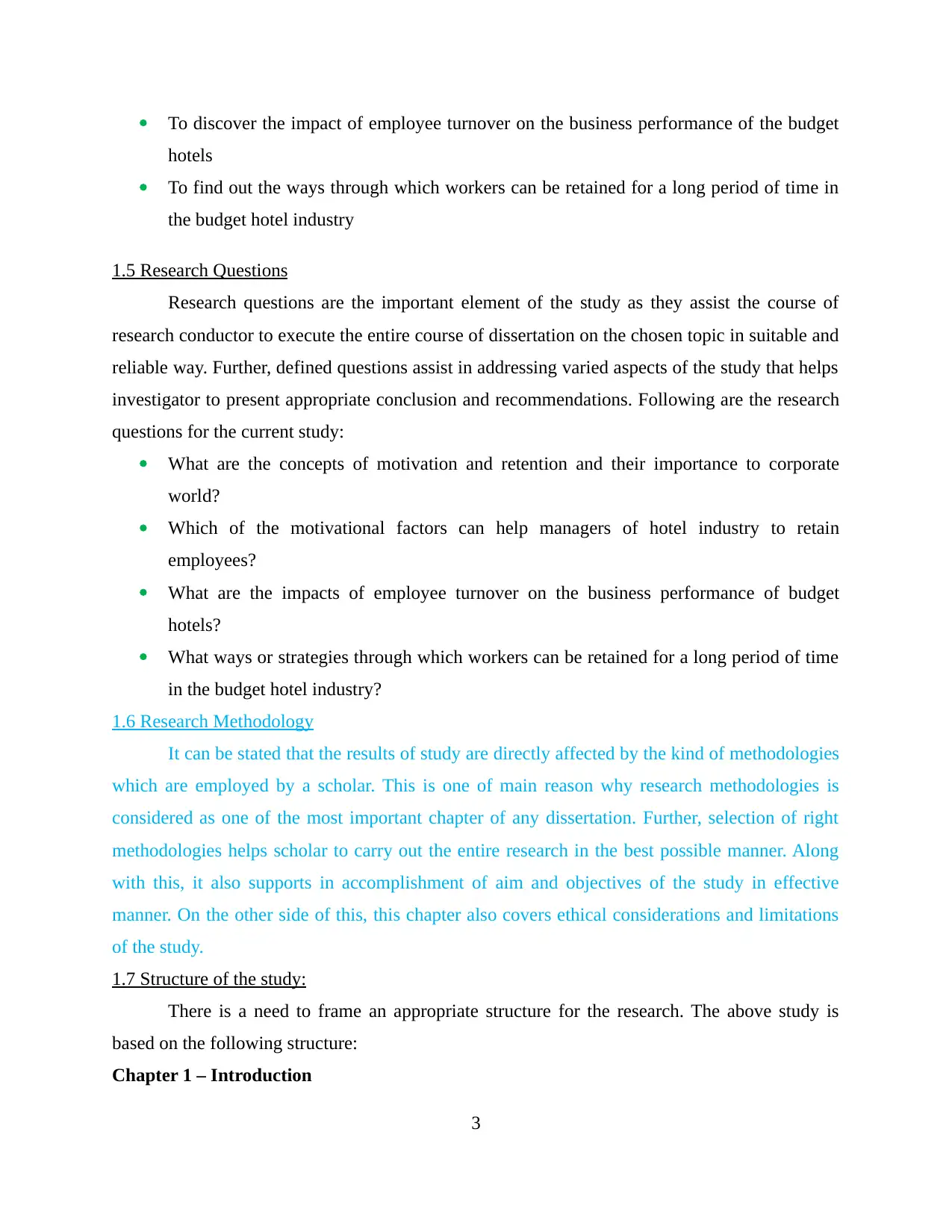
To discover the impact of employee turnover on the business performance of the budget
hotels
To find out the ways through which workers can be retained for a long period of time in
the budget hotel industry
1.5 Research Questions
Research questions are the important element of the study as they assist the course of
research conductor to execute the entire course of dissertation on the chosen topic in suitable and
reliable way. Further, defined questions assist in addressing varied aspects of the study that helps
investigator to present appropriate conclusion and recommendations. Following are the research
questions for the current study:
What are the concepts of motivation and retention and their importance to corporate
world?
Which of the motivational factors can help managers of hotel industry to retain
employees?
What are the impacts of employee turnover on the business performance of budget
hotels?
What ways or strategies through which workers can be retained for a long period of time
in the budget hotel industry?
1.6 Research Methodology
It can be stated that the results of study are directly affected by the kind of methodologies
which are employed by a scholar. This is one of main reason why research methodologies is
considered as one of the most important chapter of any dissertation. Further, selection of right
methodologies helps scholar to carry out the entire research in the best possible manner. Along
with this, it also supports in accomplishment of aim and objectives of the study in effective
manner. On the other side of this, this chapter also covers ethical considerations and limitations
of the study.
1.7 Structure of the study:
There is a need to frame an appropriate structure for the research. The above study is
based on the following structure:
Chapter 1 – Introduction
3
hotels
To find out the ways through which workers can be retained for a long period of time in
the budget hotel industry
1.5 Research Questions
Research questions are the important element of the study as they assist the course of
research conductor to execute the entire course of dissertation on the chosen topic in suitable and
reliable way. Further, defined questions assist in addressing varied aspects of the study that helps
investigator to present appropriate conclusion and recommendations. Following are the research
questions for the current study:
What are the concepts of motivation and retention and their importance to corporate
world?
Which of the motivational factors can help managers of hotel industry to retain
employees?
What are the impacts of employee turnover on the business performance of budget
hotels?
What ways or strategies through which workers can be retained for a long period of time
in the budget hotel industry?
1.6 Research Methodology
It can be stated that the results of study are directly affected by the kind of methodologies
which are employed by a scholar. This is one of main reason why research methodologies is
considered as one of the most important chapter of any dissertation. Further, selection of right
methodologies helps scholar to carry out the entire research in the best possible manner. Along
with this, it also supports in accomplishment of aim and objectives of the study in effective
manner. On the other side of this, this chapter also covers ethical considerations and limitations
of the study.
1.7 Structure of the study:
There is a need to frame an appropriate structure for the research. The above study is
based on the following structure:
Chapter 1 – Introduction
3
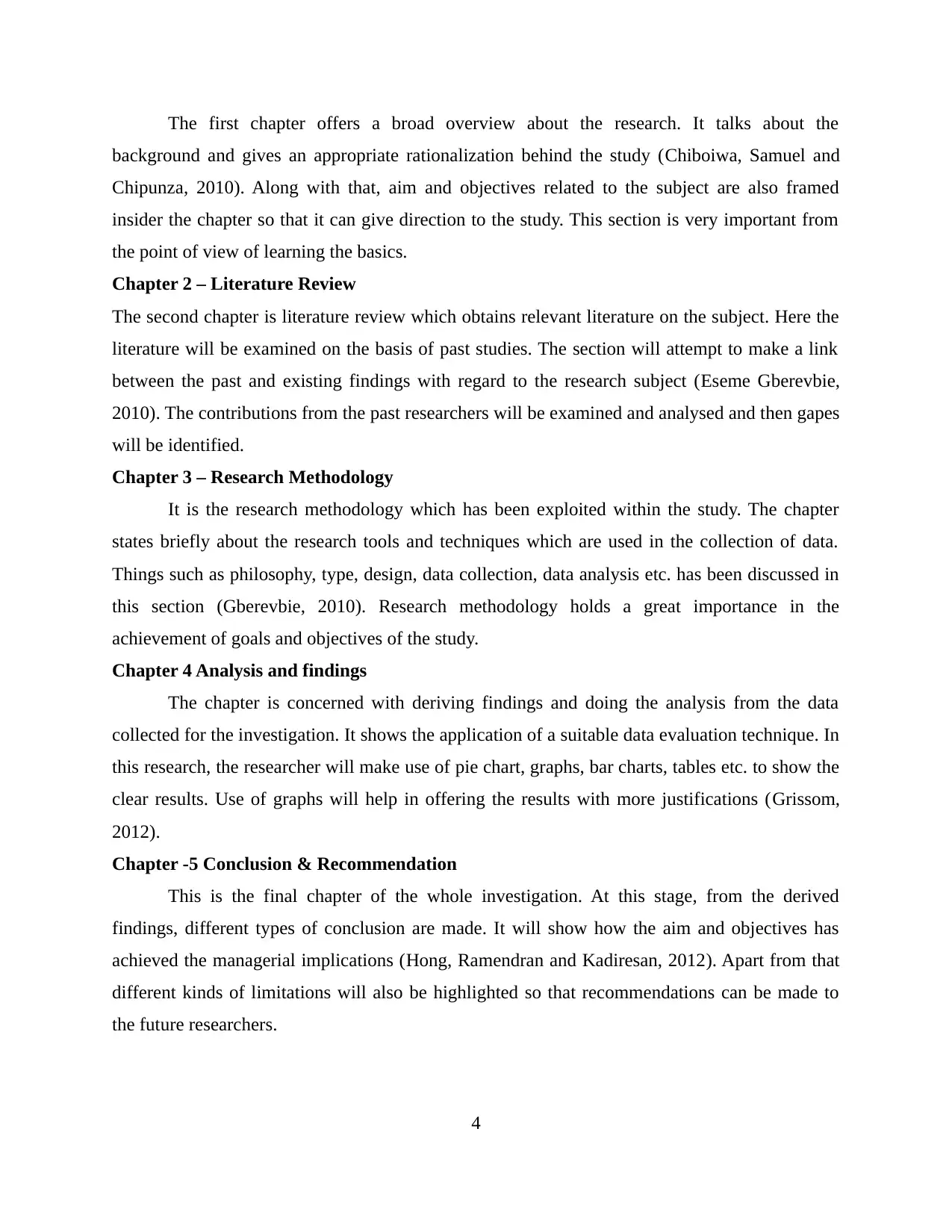
The first chapter offers a broad overview about the research. It talks about the
background and gives an appropriate rationalization behind the study (Chiboiwa, Samuel and
Chipunza, 2010). Along with that, aim and objectives related to the subject are also framed
insider the chapter so that it can give direction to the study. This section is very important from
the point of view of learning the basics.
Chapter 2 – Literature Review
The second chapter is literature review which obtains relevant literature on the subject. Here the
literature will be examined on the basis of past studies. The section will attempt to make a link
between the past and existing findings with regard to the research subject (Eseme Gberevbie,
2010). The contributions from the past researchers will be examined and analysed and then gapes
will be identified.
Chapter 3 – Research Methodology
It is the research methodology which has been exploited within the study. The chapter
states briefly about the research tools and techniques which are used in the collection of data.
Things such as philosophy, type, design, data collection, data analysis etc. has been discussed in
this section (Gberevbie, 2010). Research methodology holds a great importance in the
achievement of goals and objectives of the study.
Chapter 4 Analysis and findings
The chapter is concerned with deriving findings and doing the analysis from the data
collected for the investigation. It shows the application of a suitable data evaluation technique. In
this research, the researcher will make use of pie chart, graphs, bar charts, tables etc. to show the
clear results. Use of graphs will help in offering the results with more justifications (Grissom,
2012).
Chapter -5 Conclusion & Recommendation
This is the final chapter of the whole investigation. At this stage, from the derived
findings, different types of conclusion are made. It will show how the aim and objectives has
achieved the managerial implications (Hong, Ramendran and Kadiresan, 2012). Apart from that
different kinds of limitations will also be highlighted so that recommendations can be made to
the future researchers.
4
background and gives an appropriate rationalization behind the study (Chiboiwa, Samuel and
Chipunza, 2010). Along with that, aim and objectives related to the subject are also framed
insider the chapter so that it can give direction to the study. This section is very important from
the point of view of learning the basics.
Chapter 2 – Literature Review
The second chapter is literature review which obtains relevant literature on the subject. Here the
literature will be examined on the basis of past studies. The section will attempt to make a link
between the past and existing findings with regard to the research subject (Eseme Gberevbie,
2010). The contributions from the past researchers will be examined and analysed and then gapes
will be identified.
Chapter 3 – Research Methodology
It is the research methodology which has been exploited within the study. The chapter
states briefly about the research tools and techniques which are used in the collection of data.
Things such as philosophy, type, design, data collection, data analysis etc. has been discussed in
this section (Gberevbie, 2010). Research methodology holds a great importance in the
achievement of goals and objectives of the study.
Chapter 4 Analysis and findings
The chapter is concerned with deriving findings and doing the analysis from the data
collected for the investigation. It shows the application of a suitable data evaluation technique. In
this research, the researcher will make use of pie chart, graphs, bar charts, tables etc. to show the
clear results. Use of graphs will help in offering the results with more justifications (Grissom,
2012).
Chapter -5 Conclusion & Recommendation
This is the final chapter of the whole investigation. At this stage, from the derived
findings, different types of conclusion are made. It will show how the aim and objectives has
achieved the managerial implications (Hong, Ramendran and Kadiresan, 2012). Apart from that
different kinds of limitations will also be highlighted so that recommendations can be made to
the future researchers.
4
⊘ This is a preview!⊘
Do you want full access?
Subscribe today to unlock all pages.

Trusted by 1+ million students worldwide
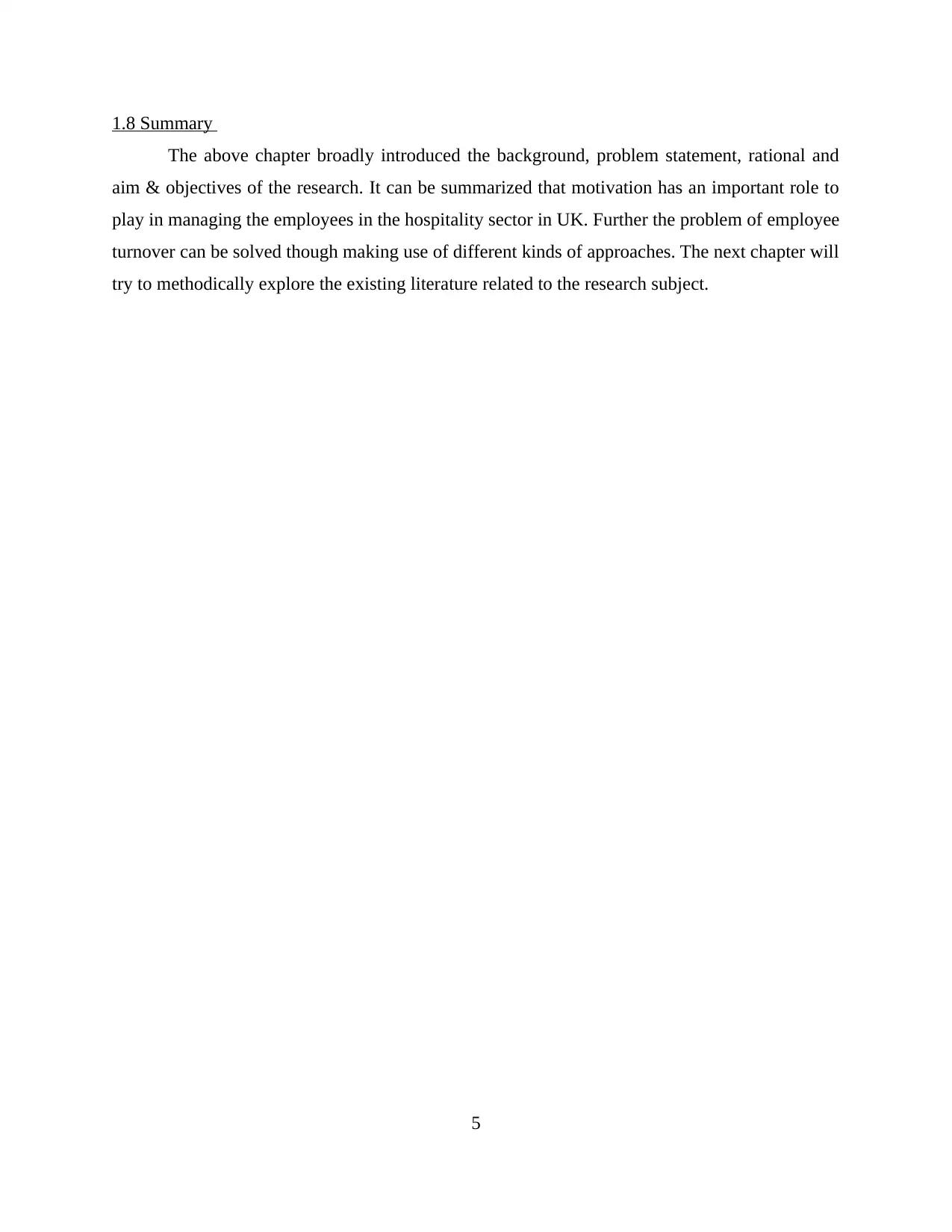
1.8 Summary
The above chapter broadly introduced the background, problem statement, rational and
aim & objectives of the research. It can be summarized that motivation has an important role to
play in managing the employees in the hospitality sector in UK. Further the problem of employee
turnover can be solved though making use of different kinds of approaches. The next chapter will
try to methodically explore the existing literature related to the research subject.
5
The above chapter broadly introduced the background, problem statement, rational and
aim & objectives of the research. It can be summarized that motivation has an important role to
play in managing the employees in the hospitality sector in UK. Further the problem of employee
turnover can be solved though making use of different kinds of approaches. The next chapter will
try to methodically explore the existing literature related to the research subject.
5
Paraphrase This Document
Need a fresh take? Get an instant paraphrase of this document with our AI Paraphraser
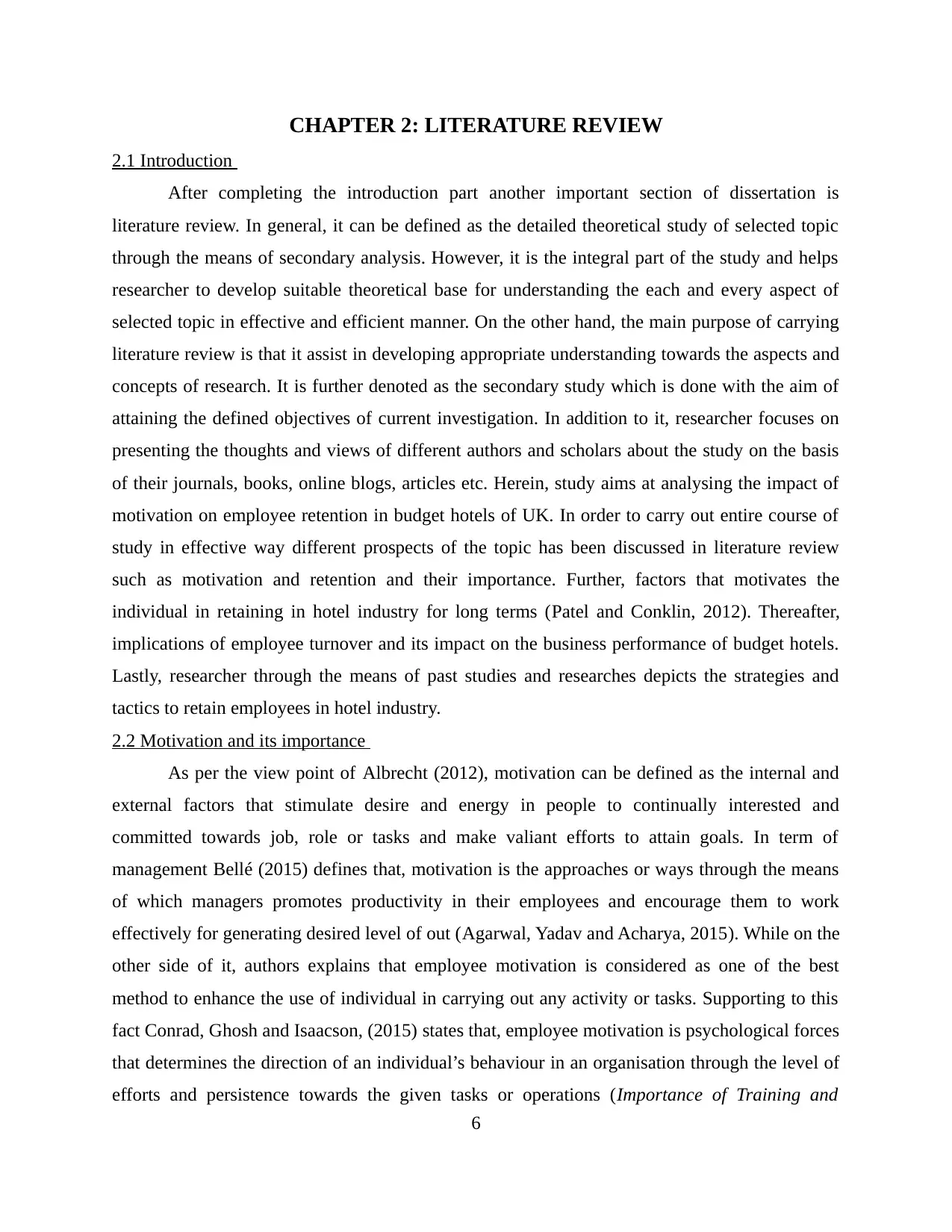
CHAPTER 2: LITERATURE REVIEW
2.1 Introduction
After completing the introduction part another important section of dissertation is
literature review. In general, it can be defined as the detailed theoretical study of selected topic
through the means of secondary analysis. However, it is the integral part of the study and helps
researcher to develop suitable theoretical base for understanding the each and every aspect of
selected topic in effective and efficient manner. On the other hand, the main purpose of carrying
literature review is that it assist in developing appropriate understanding towards the aspects and
concepts of research. It is further denoted as the secondary study which is done with the aim of
attaining the defined objectives of current investigation. In addition to it, researcher focuses on
presenting the thoughts and views of different authors and scholars about the study on the basis
of their journals, books, online blogs, articles etc. Herein, study aims at analysing the impact of
motivation on employee retention in budget hotels of UK. In order to carry out entire course of
study in effective way different prospects of the topic has been discussed in literature review
such as motivation and retention and their importance. Further, factors that motivates the
individual in retaining in hotel industry for long terms (Patel and Conklin, 2012). Thereafter,
implications of employee turnover and its impact on the business performance of budget hotels.
Lastly, researcher through the means of past studies and researches depicts the strategies and
tactics to retain employees in hotel industry.
2.2 Motivation and its importance
As per the view point of Albrecht (2012), motivation can be defined as the internal and
external factors that stimulate desire and energy in people to continually interested and
committed towards job, role or tasks and make valiant efforts to attain goals. In term of
management Bellé (2015) defines that, motivation is the approaches or ways through the means
of which managers promotes productivity in their employees and encourage them to work
effectively for generating desired level of out (Agarwal, Yadav and Acharya, 2015). While on the
other side of it, authors explains that employee motivation is considered as one of the best
method to enhance the use of individual in carrying out any activity or tasks. Supporting to this
fact Conrad, Ghosh and Isaacson, (2015) states that, employee motivation is psychological forces
that determines the direction of an individual’s behaviour in an organisation through the level of
efforts and persistence towards the given tasks or operations (Importance of Training and
6
2.1 Introduction
After completing the introduction part another important section of dissertation is
literature review. In general, it can be defined as the detailed theoretical study of selected topic
through the means of secondary analysis. However, it is the integral part of the study and helps
researcher to develop suitable theoretical base for understanding the each and every aspect of
selected topic in effective and efficient manner. On the other hand, the main purpose of carrying
literature review is that it assist in developing appropriate understanding towards the aspects and
concepts of research. It is further denoted as the secondary study which is done with the aim of
attaining the defined objectives of current investigation. In addition to it, researcher focuses on
presenting the thoughts and views of different authors and scholars about the study on the basis
of their journals, books, online blogs, articles etc. Herein, study aims at analysing the impact of
motivation on employee retention in budget hotels of UK. In order to carry out entire course of
study in effective way different prospects of the topic has been discussed in literature review
such as motivation and retention and their importance. Further, factors that motivates the
individual in retaining in hotel industry for long terms (Patel and Conklin, 2012). Thereafter,
implications of employee turnover and its impact on the business performance of budget hotels.
Lastly, researcher through the means of past studies and researches depicts the strategies and
tactics to retain employees in hotel industry.
2.2 Motivation and its importance
As per the view point of Albrecht (2012), motivation can be defined as the internal and
external factors that stimulate desire and energy in people to continually interested and
committed towards job, role or tasks and make valiant efforts to attain goals. In term of
management Bellé (2015) defines that, motivation is the approaches or ways through the means
of which managers promotes productivity in their employees and encourage them to work
effectively for generating desired level of out (Agarwal, Yadav and Acharya, 2015). While on the
other side of it, authors explains that employee motivation is considered as one of the best
method to enhance the use of individual in carrying out any activity or tasks. Supporting to this
fact Conrad, Ghosh and Isaacson, (2015) states that, employee motivation is psychological forces
that determines the direction of an individual’s behaviour in an organisation through the level of
efforts and persistence towards the given tasks or operations (Importance of Training and
6
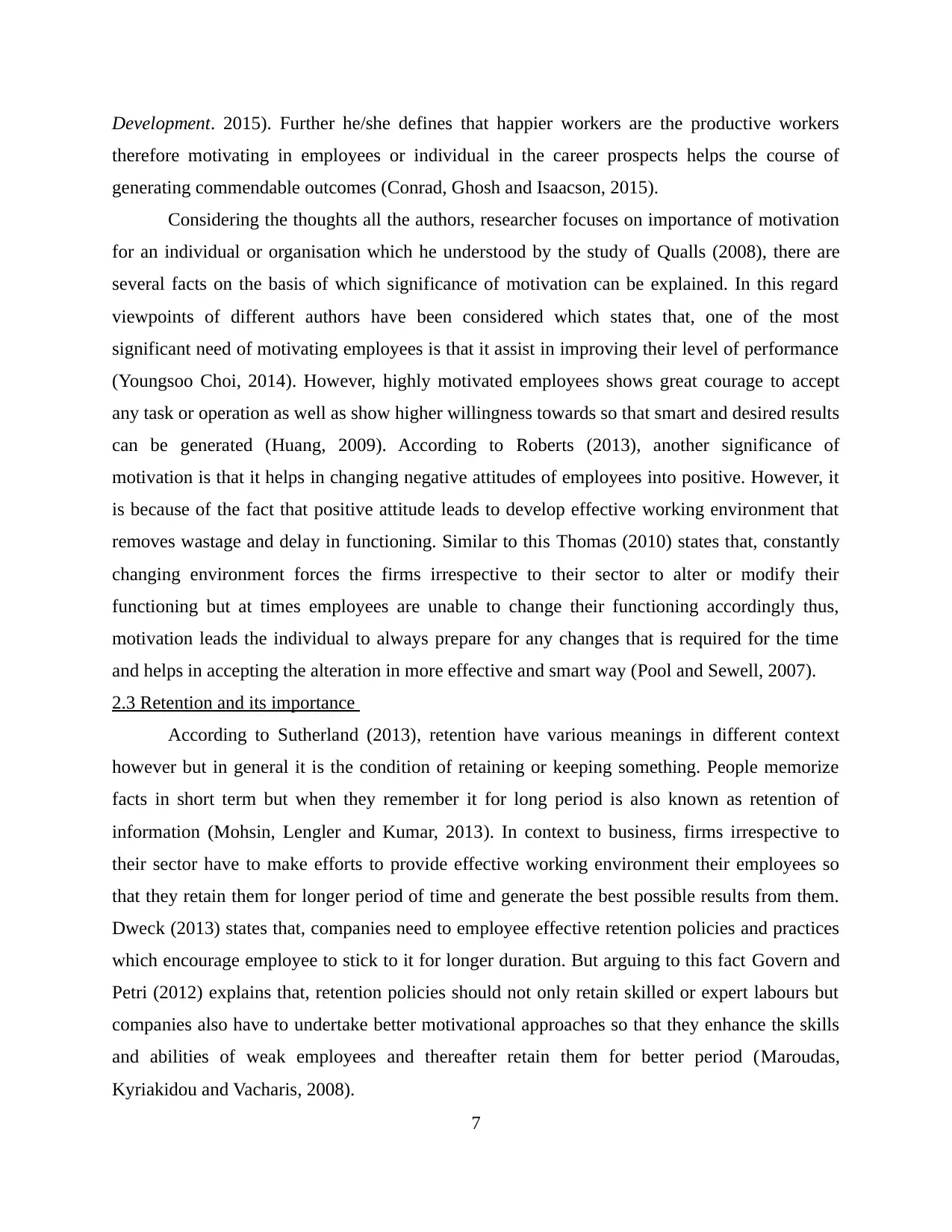
Development. 2015). Further he/she defines that happier workers are the productive workers
therefore motivating in employees or individual in the career prospects helps the course of
generating commendable outcomes (Conrad, Ghosh and Isaacson, 2015).
Considering the thoughts all the authors, researcher focuses on importance of motivation
for an individual or organisation which he understood by the study of Qualls (2008), there are
several facts on the basis of which significance of motivation can be explained. In this regard
viewpoints of different authors have been considered which states that, one of the most
significant need of motivating employees is that it assist in improving their level of performance
(Youngsoo Choi, 2014). However, highly motivated employees shows great courage to accept
any task or operation as well as show higher willingness towards so that smart and desired results
can be generated (Huang, 2009). According to Roberts (2013), another significance of
motivation is that it helps in changing negative attitudes of employees into positive. However, it
is because of the fact that positive attitude leads to develop effective working environment that
removes wastage and delay in functioning. Similar to this Thomas (2010) states that, constantly
changing environment forces the firms irrespective to their sector to alter or modify their
functioning but at times employees are unable to change their functioning accordingly thus,
motivation leads the individual to always prepare for any changes that is required for the time
and helps in accepting the alteration in more effective and smart way (Pool and Sewell, 2007).
2.3 Retention and its importance
According to Sutherland (2013), retention have various meanings in different context
however but in general it is the condition of retaining or keeping something. People memorize
facts in short term but when they remember it for long period is also known as retention of
information (Mohsin, Lengler and Kumar, 2013). In context to business, firms irrespective to
their sector have to make efforts to provide effective working environment their employees so
that they retain them for longer period of time and generate the best possible results from them.
Dweck (2013) states that, companies need to employee effective retention policies and practices
which encourage employee to stick to it for longer duration. But arguing to this fact Govern and
Petri (2012) explains that, retention policies should not only retain skilled or expert labours but
companies also have to undertake better motivational approaches so that they enhance the skills
and abilities of weak employees and thereafter retain them for better period (Maroudas,
Kyriakidou and Vacharis, 2008).
7
therefore motivating in employees or individual in the career prospects helps the course of
generating commendable outcomes (Conrad, Ghosh and Isaacson, 2015).
Considering the thoughts all the authors, researcher focuses on importance of motivation
for an individual or organisation which he understood by the study of Qualls (2008), there are
several facts on the basis of which significance of motivation can be explained. In this regard
viewpoints of different authors have been considered which states that, one of the most
significant need of motivating employees is that it assist in improving their level of performance
(Youngsoo Choi, 2014). However, highly motivated employees shows great courage to accept
any task or operation as well as show higher willingness towards so that smart and desired results
can be generated (Huang, 2009). According to Roberts (2013), another significance of
motivation is that it helps in changing negative attitudes of employees into positive. However, it
is because of the fact that positive attitude leads to develop effective working environment that
removes wastage and delay in functioning. Similar to this Thomas (2010) states that, constantly
changing environment forces the firms irrespective to their sector to alter or modify their
functioning but at times employees are unable to change their functioning accordingly thus,
motivation leads the individual to always prepare for any changes that is required for the time
and helps in accepting the alteration in more effective and smart way (Pool and Sewell, 2007).
2.3 Retention and its importance
According to Sutherland (2013), retention have various meanings in different context
however but in general it is the condition of retaining or keeping something. People memorize
facts in short term but when they remember it for long period is also known as retention of
information (Mohsin, Lengler and Kumar, 2013). In context to business, firms irrespective to
their sector have to make efforts to provide effective working environment their employees so
that they retain them for longer period of time and generate the best possible results from them.
Dweck (2013) states that, companies need to employee effective retention policies and practices
which encourage employee to stick to it for longer duration. But arguing to this fact Govern and
Petri (2012) explains that, retention policies should not only retain skilled or expert labours but
companies also have to undertake better motivational approaches so that they enhance the skills
and abilities of weak employees and thereafter retain them for better period (Maroudas,
Kyriakidou and Vacharis, 2008).
7
⊘ This is a preview!⊘
Do you want full access?
Subscribe today to unlock all pages.

Trusted by 1+ million students worldwide
1 out of 66
Related Documents
Your All-in-One AI-Powered Toolkit for Academic Success.
+13062052269
info@desklib.com
Available 24*7 on WhatsApp / Email
![[object Object]](/_next/static/media/star-bottom.7253800d.svg)
Unlock your academic potential
Copyright © 2020–2026 A2Z Services. All Rights Reserved. Developed and managed by ZUCOL.





